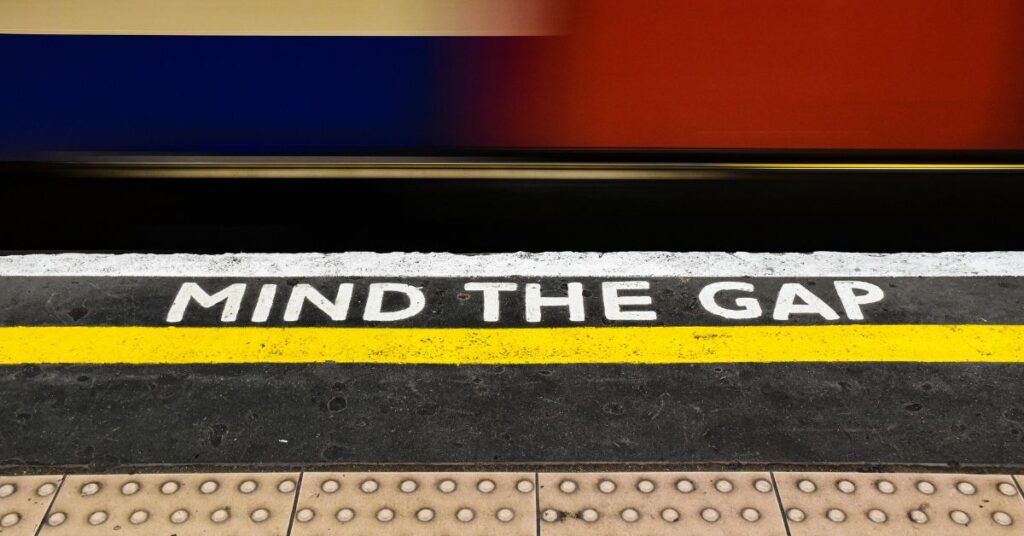By: Stephen McAlpine
Have you seen or heard that warning on a train system, “Mind the Gap”?
It’s usually written on the platform or announced from the station audio at older train stations where the gap between the train and the platform could swallow your leg. Or a toddler. I’ve seen it in London and there are a few here in Sydney.
Mind the gap! Be careful! Watch out!
That sort of gap is dangerous physically. We do well to “mind it”.
But what about the spiritual gap? Do we mind that? And ministry leaders in particular. The gap between our public assertions and our private actions. Because that gap can eventually swallow you whole. There’s another type of platform where the gap is dangerous, and that’s the ministry platform.
Those in Reformed circles have been sobered by the Josh Buice scandal on social media, in which the founder of the G3 conference, who at the very time he often called out people online for hiding behind social media, was trolling and abusing other Christian leaders with anonymous accounts. And then denying it over the years until he was found out.
Trolling leaders in his own tradition. Friends he had once shared platforms with, in which the message to ministry people was often “Mind the gap!”
Of course if only he had known it’s okay with God to abuse and mistreat those from other Christian traditions online. God’s completely okay with vitriol and reviling others as long as … oh wait? You are saying God’s not okay with that?
All dark humour aside, there was a certain level of schadenfreude after Buice had shut down all his media accounts, and been stood down from his roles, at the tweeting of screenshots in which he called out anonymous online trolls.
King Saul and The Gap
The tragic tale of King Saul and his downward spiral reaches its nadir in the chapter before his death, 1 Samuel 28. And it’s a story of how Saul did not mind the gap. And how it took him down.
There he is, surrounded by the Philistines, and terrified of what is going to happen. Samuel the prophet is dead, and God no longer speaks to Saul. He is bereft, alone and frantic.
The start of the episode gives us a little hint as to the gap that Saul has not minded in his own life. In fact as it unfolds, we see that Saul’s refusal to mind the small gaps in his life early on in his reign, has led to chasm-sized gaps by the time he is in terminal decline. Here’s what we read:
Now Samuel was dead, and all Israel had mourned for him and buried him in his own town of Ramah. Saul had expelled the mediums and spiritists from the land. The Philistines assembled and came and set up camp at Shunem, while Saul gathered all Israel and set up camp at Gilboa. When Saul saw the Philistine army, he was afraid; terror filled his heart… (1 Samuel 28:3-5)
It’s an aside isn’t it? Why do we need to know that Saul had basically kicked out all of the witches? Because of what happens next:
He inquired of the Lord, but the Lord did not answer him by dreams or Urim or prophets. Saul then said to his attendants, “Find me a woman who is a medium, so I may go and inquire of her.”
“Hey,” thinks Saul, “Why’s it so hard to find a witch around these parts? Oh that’s right – I killed them all! Silly me!” I wonder if his own men were horrified by his request.
Now this episode raises all sorts of questions about witches, and whether the witch really brought up Samuel, given that Saul could not see the figure of Samuel, but only had Samuel’s words relayed by the witch. But that’s beside the point. The point is that the gap in the king of Israel’s life had grown to a chasm. And that was going to bring him down. His public assertions “Get rid of the witches!” were thrown to the side when he needed some advice.
But it’s not like this was a one-off. A mere peccadillo. The problem with the gap in Saul’s life, and surely the problem of the gap in our own lives, is that the disobedience towards God that he exhibited right here at the end, was simply the trajectory of what had gone on earlier. The gap had grown. And he wasn’t minding it!
First he implicitly disobeys God by sacrificing before Samuel turns up, even though Samuel had said “wait for me” (1 Samuel 13). At that point the prophet turns up – talk about timing! – and announces that Saul’s kingdom would not last. Now you would think that that would be a warning shot across his bows. But it isn’t enough! Saul ramps things up.
So two chapters later in 1 Samuel 15, Saul explicitly disobeys when told the dispense with every Amalekite and everything they own. He didn’t. He kept some back. And then makes excuses as to why he did so. And Samuel tells him this time that not only will his kingdom not last (it might wither away in a few generations), it will actually be torn from him! The buck – and his dynasty – stops with him!
And so we end up at a witch’s house, where in a parody of the Last Supper that would have made a Paris Olympics organising committee proud, Saul, the king of Israel, has a meal prepared for him the day before his death and he goes out into the night – cursed.
Us and The Gap
Sobering. But a warning for us. Not for no good reason do we read in the New Testament to be careful not to be hardened by sin’s “deceitfulness”
“You know that gap in your life? The gap between your public assertions and your private actions? That doesn’t really matter. That won’t be unbridgeable should you try to leap back to safety. That is manageable for you. You can spin those plates without it all coming crashing down. Others have been caught out doing this – countless others – but you’re smarter than that!”
All delicious lies. All designed to stop you seeing the growing gap that sin is carving out in your life. Yet time and time again when we see public Christian figures fall, it’s never because of one significant decision that flew in the face of every other decision that they had made. Perhaps publicly. But never privately.
The trouble with Saul – and with us – is that the sin behind the sin is what trips us up. In 1 Samuel 13 it is Saul’s fear – his lack of trust in God – that pushes him to conduct the sacrifice against Samuel’s instructions. His subjects are melting away in the face of the enemy, and so he decides to take matters into his own hands.
And that fear drives him to keep alive a king who should have been killed. He wants him as a trophy, a subject perhaps. And why kill all those well-fed animals that are in better shape than our lot? The gap in Saul’s life does not widen because he deeply desires to disobey God. The gap in Saul’s life widens because he does not trust that God will come through for him in the areas of his life that he most worries about.
How about us? Especially us in leadership in light of the failures that are pretty much tripping over themselves to get onto social media platforms.
How about our difficult marriage? Our struggling ministry? Our poor finances? Our need to be justified in the eyes of others? These are the areas of life that we worry about, and they are the places that sin’s deceitful comes in, and drives a gap between our public assertions and our private actions.
In all of these we need to mind the gap! The Bible tells us that there are ways that seem right to us that end in death (Prof 14:12). That’s the wages of sin right there! And that’s Samuel’s message to Saul. You didn’t listen to me when I was alive, why are you bothering me now that I am dead? And oh, you’ll be dead soon too.
No More Gaps!
There’s a lot of darkness in that story. And not much light. Not much at all. But perhaps there is some. There’s another Last Supper that’s coming in which a king has a meal before his death, and who then goes out into the night, not doubting God, but entrusting himself to his Heavenly Father. The next day he is strung up outside a city.
It’s not a meal prepared by a witch, but as 1 Corinthians 11 reminds us, it’s a meal in which Jesus gives thanks to God, and then says “this is the new covenant in my blood” as he offers his disciples the cup. A new covenant of obedience, because the old covenant was super-frayed and always broken through disobedience. Jesus then goes out to face the enemy for our sakes, and is strung up outside a city.
But not because of the gap in his life. Because of the gaps in ours. He could even look at his enemies and ask “Which of you accuses me of sin?” (John 8:45). When it comes to his public assertions and his private actions, Jesus is the ultimate equivalent of that building product “No More Gaps!” Finally a king whose life is completely sealed off from sin, insincerity, hypocrisy, disobedience, fear of man, you name it!
Here’s the Israelite king that Israel has always needed. That we have always needed. A “No More Gaps” kinda king who leads his people into battle, wins the victory for them, facing down the terror of death, and although buried by his mournful followers like King Saul was, is raised to life again, to rule and reign forever.
And he’s the king who, as we come to him, all too aware of the growing gaps in our lives, calls us to approach the throne of his kingly grace in time of need (Hebrews 4:16).
Perhaps that time of need is where you are at right now. If so, don’t let the gap grow so wide that the chasm swallows you whole. Your king has done everything for you to strengthen you to obey and close that gap. Pray for his strength today.
Article supplied with thanks to Stephen McAlpine
About the Author: Stephen has been reading, writing and reflecting ever since he can remember. A former church pastor, he now trains church and ministry leaders, and in his writing dabbles in a number of fields, notably theology and culture.
Feature image: Canva





